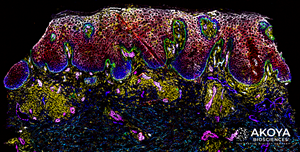Akoya Biosciences, Inc., The Spatial Biology Company®, announced that it will be offering the CODEX® solution’s single-cell, whole-tissue imaging capabilities to the Chan Zuckerberg Initiative’s grantees, under favorable commercial terms.
CODEX’s single-cell, multiplex imaging capabilities to be included in Chan Zuckerberg Initiative grantee toolkit to help fuel the next wave of biological discoveries
MARLBOROUGH, Mass., June 15, 2021 (GLOBE NEWSWIRE) -- Akoya Biosciences, Inc., (Nasdaq: AKYA) The Spatial Biology Company®, today announced that it will be offering the CODEX® solution’s single-cell, whole-tissue imaging capabilities to the Chan Zuckerberg Initiative’s (CZI) grantees, under favorable commercial terms. Currently, there are more than 350 labs in the CZI grantee network.
CZI’s mission is to help solve some of the world’s toughest challenges, and its work in science places an emphasis on supporting new scientific approaches to study human health and disease. The advent of high parameter imaging platforms, like CODEX®, is now allowing biological researchers to catalogue the vast diversity of cellular phenotypes within a tissue sample, while maintaining their spatial context. This new method, called spatial phenotyping, facilitates the analysis of how cells organize and interact with each other to influence disease progression and treatment outcomes.
“Single-cell biology is shedding light on a critical resolution of life and providing countless insights into fundamental questions of health and disease. Emerging technologies that provide single-cell resolution while retaining the spatial relationships of cells within tissue are an exciting and important complement to current methods,” said CZI Science Program Officer Dr. Jonah Cool.
Dr. Emma Lundberg, Professor of Cell Biology Proteomics at the KTH Royal Institute of Technology, Sweden (SciLifeLab) and Director of the Cell Atlas, part of the Human Protein Atlas program, has actively collaborated with CZI and received grant support to integrate single-cell genomics and spatial proteomics methods to build a comprehensive cell atlas. “Studying the full complexity of cell function and behaviour requires a multi-modal view of each cell type and integrating genomics, proteomics, and imaging datasets. We are using CODEX® for cataloging both cell and protein diversity while capturing how they are localized across the tissue landscape. Such a comprehensive view can give us deeper insights into how healthy and diseased tissues behave.”
“We’re pleased with the addition of the CODEX® system to the single-cell biology tool kit of the CZI grantee network,” said Brian McKelligon, CEO, Akoya Biosciences. “Spatial phenotyping is enabling researchers to view biology along an entirely new dimension and can lead to breakthrough discoveries with the potential to improve human health.”
Dr. Oliver Braubach, Head of Research Applications at Akoya, will introduce the CODEX® platform and give a walk-through of the latest case studies in an upcoming webinar on June 24 at 1 pm Eastern / 10 a.m. Pacific. Dr. Braubach’s talk will be preceded by an introduction to CZI’s Single-Cell Biology Program, by Dr. Cool. Please register for this event.
About the Chan Zuckerberg Initiative
The Chan Zuckerberg Initiative was founded in 2015 to help solve some of society’s toughest challenges — from eradicating disease and improving education, to addressing the needs of our local communities. Our mission is to build a more inclusive, just, and healthy future for everyone. For more information, please visit www.chanzuckerberg.com.
About Akoya Biosciences
As The Spatial Biology Company®, Akoya Biosciences’ mission is to bring context to the world of biology and human health through the power of spatial phenotyping. The company offers comprehensive single-cell imaging solutions that allow researchers to phenotype cells with spatial context and visualize how they organize and interact to influence disease progression and treatment response. Akoya offers two distinct solutions, the CODEX® and Phenoptics™ platforms, to serve the diverse needs of researchers across discovery, translational and clinical research. To learn more about Akoya, visit www.akoyabio.com.
Cautionary Note Regarding Forward Looking Statements
This press release contains “forward-looking statements” under applicable securities laws. In some cases, such statements can be identified by words such as: “may," "will," "could," "would," "should," "expect," "intend," "plan," "anticipate," "believe," "estimate," "predict," "project," "potential," "continue," "ongoing" or the negative of these terms or other comparable terminology, although not all forward-looking statements contain these words. Forward-looking statements include express or implied statements regarding our ability to achieve our business strategies, growth, or other future events or conditions. Such statements are based on our current beliefs, expectations, and assumptions about future events or conditions, which are subject to inherent risks and uncertainties, including the risks and uncertainties discussed in the filings we make from time to time with the Securities and Exchange Commission. Actual results may differ materially from those indicated in forward-looking statements, and you should not place undue reliance on them. All statements herein are based only on information currently available to us and speak only as of the date hereof. Except as required by law, we undertake no obligation to update any such statement.
Investor Contact:
David Deuchler
Gilmartin Group LLC
investors@akoyabio.com
Media Contact:
Michelle Linn
Bioscribe, Inc.
michelle@bioscribe.com
A photo accompanying this announcement is available at https://www.globenewswire.com/NewsRoom/AttachmentNg/1d082a44-a8d6-41be-a612-75b3e1a31bd1





